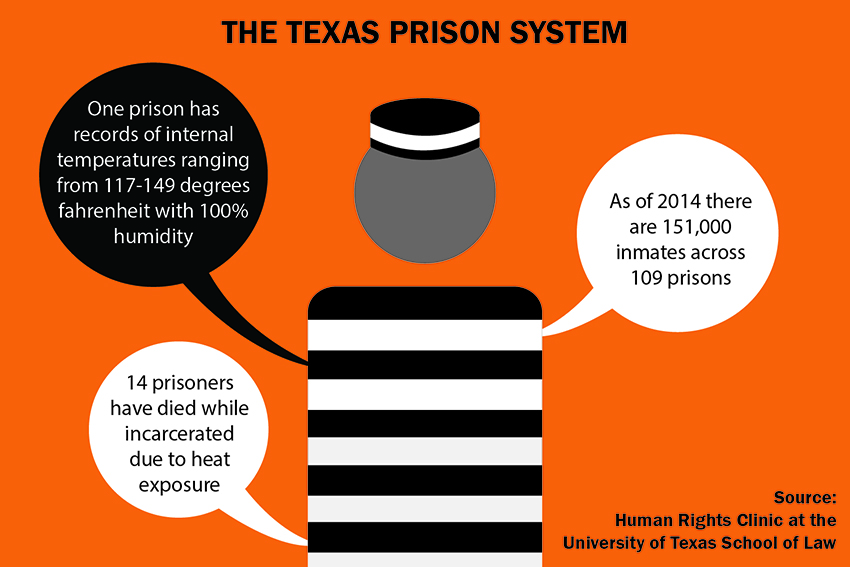If you think Texas summers are bad, imagine enduring them without air conditioning. This is just one of the many unfair circumstances inmates in Texas prisons encounter. Other issues include lack of independent oversight, denial of an attorney through habeas corpus once in the system and abnormally high medical copayments of $100 despite having no income. In response to these, inmates from seven different state prisons have been conducting a work strike since April 4 to protest unfair conditions.
Many criticize the prisoners for unionizing and fighting these injustices simply because they are criminals. While these inmates have committed a crime and need some penalty for their actions, we need to understand that prisoners are still people who have basic rights and deserve humane living conditions.
Amanda Woog, a postdoctoral fellow at UT who is affiliated with the Institute for Urban Policy Research and Analysis, spoke on the moral obligations to their human rights.
“The fact is that people who are in prison do have basic rights to certain conditions of confinement related to issues such as healthcare and overcrowding,” Woog said. “They are not the rights that you or I have, but they do have a right to safe conditions.”
Most of us have not been in a prison and are not aware of the conditions the incarcerated face. It is imperative we are mature enough to listen to those from within who are speaking out. There needs to be a balance between proper punishment for the crime and fair living conditions.
Some of the conditions can be life-threatening. Take the lack of air conditioning and proper ventilation found in Texas prisons. Since 2007, extreme heat has been the cause of death for 14 inmates, all of which had a body temperature between 105 and 109 degrees Fahrenheit upon death.
Prisoners are painfully aware of their situation and rightly protest for independent oversight, which could be a substantial means of fixing these superfluous punishments.
“Independent oversight could mean a complaint process that does not just go through internal channels — people who are employed by the Texas department of criminal justice,” Woog said. “It could also mean an outside body could come in and do inspections on prison conditions.”
This appears to be more than just necessary for the prisoners. It seems to be essential to maintaining their dignity as human beings.
Ariel Dulitzky, law professor and director of the UT Human Rights Clinic, pointed out that inmates are not supposed to be robbed of their basic human rights when they enter the prison system.
“[Inmates] get to keep their rights when they are in the system,” Dulitzky said. “The main right [of prisoners is] to live with dignity and humanity.”
Although it has not yet been determined that Texas prisons run in a way that violates these rights, it is only a matter of time until conditions force some long overdue overhaul. We need to take the inmates’ complaints into consideration and recognize the humanity of those who are locked away. While the inmates may have acted in an unlawful way, the state of Texas should not meet the unjust with the unjust. Proper changes need to be made that do not deprive the inmates of their rights.
Vernon is a PACE freshman from the Woodlands. Follow her on Twitter @ _emilyvernon_.


















